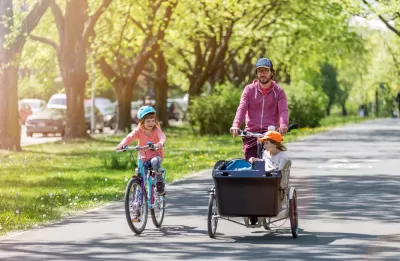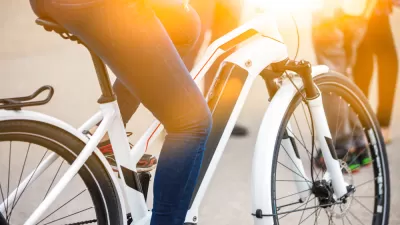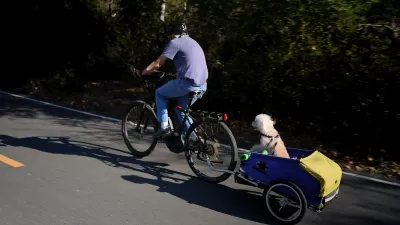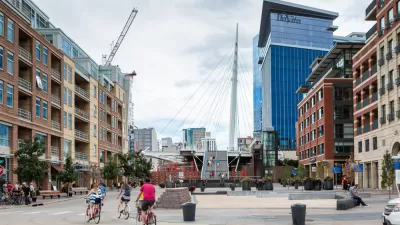The state is directing $13 million to a program to help low-income Californians purchase electric and cargo bikes, but limited bike infrastructure keeps many California streets unsafe for cyclists.

The California Air Resources Board (CARB) is launching a program to encourage more Californians to replace vehicle trips with electric bikes, reports Ryan Fonseca in the Los Angeles Times.
“CARB’s current proposal is to offer a point-of-sale incentive (different from a rebate) of $1,000 off a standard e-bike, with an additional $750 discount for larger cargo bikes, adaptive bikes or recumbent bikes.” The program will be available to residents making less than 300 percent of the federal poverty line, or roughly $83,000 for a family of four. The program was allocated $13 million by the state, with future funding dependent on the state budget.
But promoting more bicycling on dangerous roads also puts people at risk, the article notes. “Many of the lower-income communities that would benefit from the program are also the most dangerous for people to walk or bike. That’s tied to historic neglect, with cities investing less in safety infrastructure (like protected bike lanes) in neighborhoods where more residents rely on walking and transit, while also building major arterial roadways through those communities.”
FULL STORY: There’s a plan to make e-bikes more affordable for low-income Californians. Here’s what to expect

Planetizen Federal Action Tracker
A weekly monitor of how Trump’s orders and actions are impacting planners and planning in America.

Chicago’s Ghost Rails
Just beneath the surface of the modern city lie the remnants of its expansive early 20th-century streetcar system.

San Antonio and Austin are Fusing Into one Massive Megaregion
The region spanning the two central Texas cities is growing fast, posing challenges for local infrastructure and water supplies.

Since Zion's Shuttles Went Electric “The Smog is Gone”
Visitors to Zion National Park can enjoy the canyon via the nation’s first fully electric park shuttle system.

Trump Distributing DOT Safety Funds at 1/10 Rate of Biden
Funds for Safe Streets and other transportation safety and equity programs are being held up by administrative reviews and conflicts with the Trump administration’s priorities.

German Cities Subsidize Taxis for Women Amid Wave of Violence
Free or low-cost taxi rides can help women navigate cities more safely, but critics say the programs don't address the root causes of violence against women.
Urban Design for Planners 1: Software Tools
This six-course series explores essential urban design concepts using open source software and equips planners with the tools they need to participate fully in the urban design process.
Planning for Universal Design
Learn the tools for implementing Universal Design in planning regulations.
planning NEXT
Appalachian Highlands Housing Partners
Mpact (founded as Rail~Volution)
City of Camden Redevelopment Agency
City of Astoria
City of Portland
City of Laramie





























